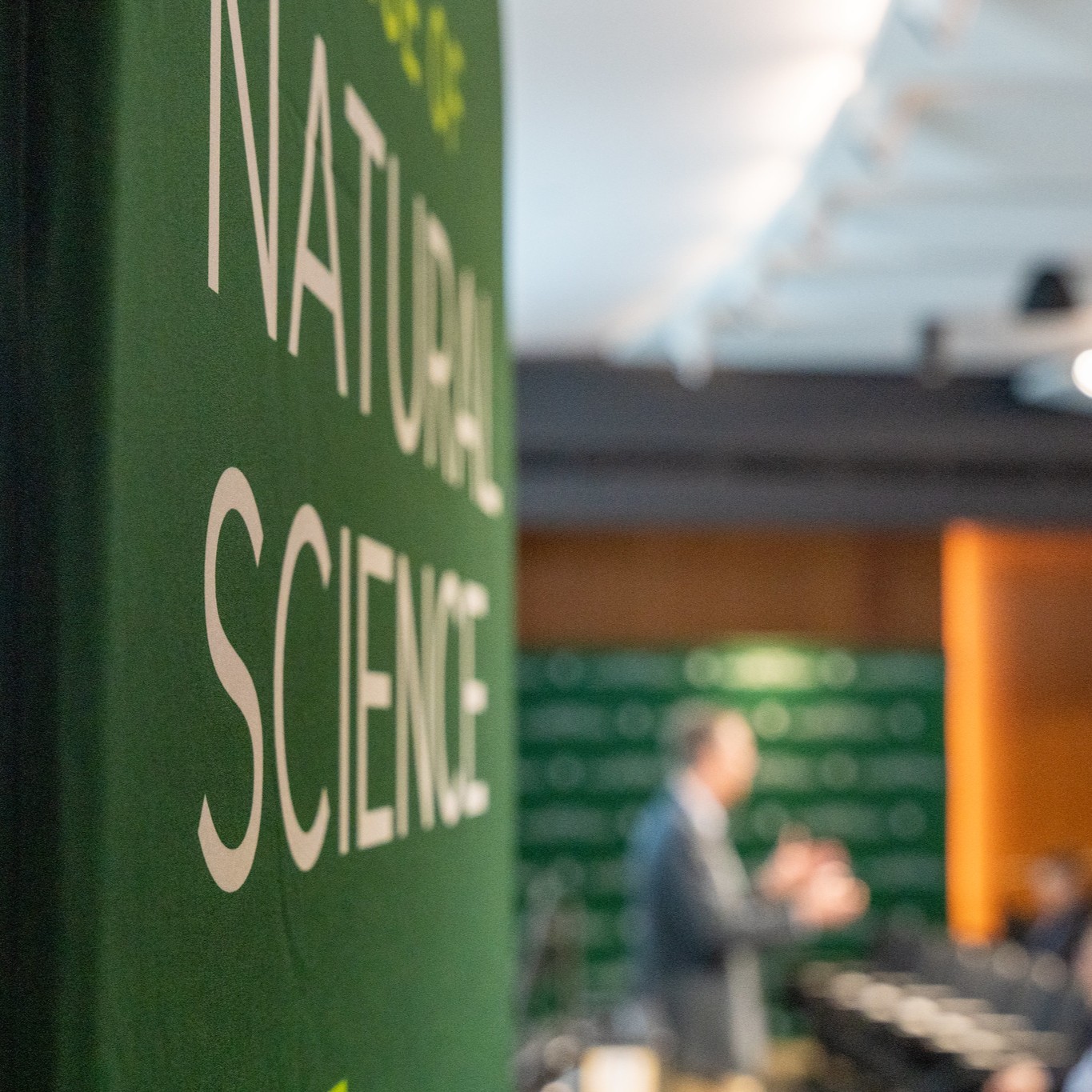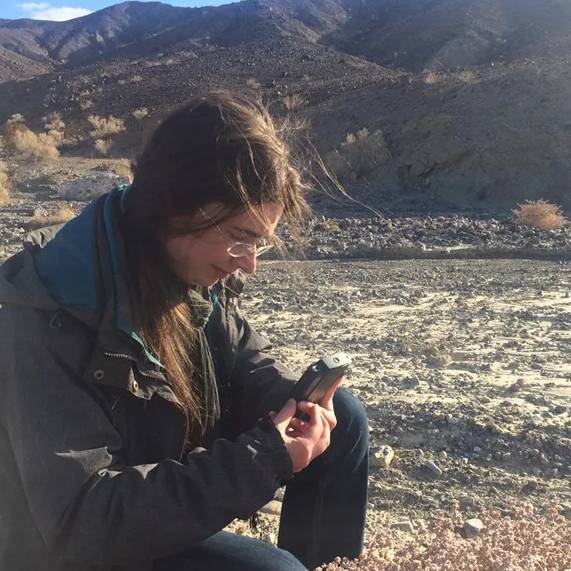Plant Biology pipeline guides students to success
Hands-on doesn’t have to mean getting your hands dirty. But it can.
Navigating an undergraduate degree can feel like solving a puzzle, with hundreds of choices for courses, extracurriculars, programs and clubs at your fingertips.
When it comes down to choosing whether to do research or take on an internship, however, students in the department of Plant Biology at Michigan State University are in luck.
They can find out whether field work, lab work, or something different altogether suits them best, thanks to a carefully planned series of courses which bookend students’ time at MSU.
Plant Biology professors Eva Farre and Tammy Long lead a set of classes — a new student seminar, led by Long, and a senior capstone co-taught by the pair. Together, these courses help students prepare for and reflect on undergraduate research opportunities and internships as they begin and end their undergraduate journeys.
While many programs at MSU encourage experiential learning, Plant Biology students are required to engage in experiential learning in order to graduate.
To make the most of these opportunities, students are encouraged to start early, reflect on their experiences often, and, as seniors, present on what they’ve done — whether research or otherwise — at the yearly University Undergraduate Research and Arts Forum, or UURAF.
This uniquely structured program provides Plant Biology undergrads with an unparalleled opportunity for professional development tailored to their interests, needs and ambitions. Recent updates to the undergraduate curriculum have allowed the program to adapt to students’ interests as new career paths emerge.
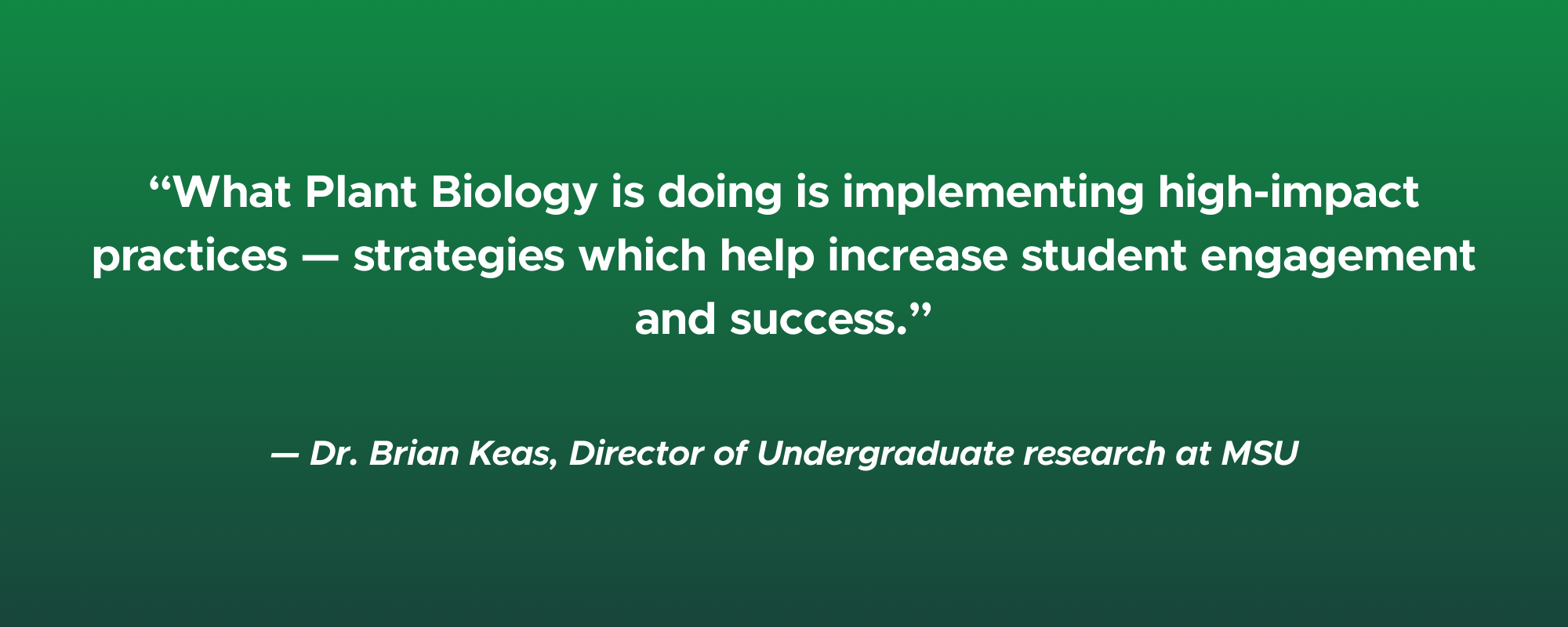
Previously, students in the program were required to take on research projects to graduate. Each student needed three experiential learning credits, earned through an undergraduate research course, PLB 498, to meet their degree requirements.
About five years ago, however, the department decided to launch PLB 495, Internships in Plant Biology, to provide credit for non-research experiences. This course supplemented the longstanding research-oriented PLB 498, which previously stood alone.
By offering two concurrent options, students had a choice between research projects or internships, expanding the experiences that could satisfy their graduation requirements.
“We wanted students to be able to engage with more diverse experiences,” said Long, explaining that students were seeking experiences other than research; experiences that the PLB 498 wasn’t designed to accommodate at the time.
Bookending Success
But getting started can be a challenge on its own. Knowing that these experiences are built into the curriculum is one thing — finding an experience of your own is another.
Fortunately, instructors and advisors in Plant Biology have a plan to help students get ahead.
“Just recently, the Undergraduate Committee had a proposal for a freshman seminar approved. The Fall 2024 cohort of first-year students was the first to go through this together,” said Plant Biology’s Academic Program Coordinator, Sara Kraeuter.
While a formalized version of the introductory seminar course is in the works, a pilot course was first launched in 2024.
Led by professor Tammy Long, the intro course is designed to orient new students to the opportunities available to them through discussions, presentations by invited speakers, and other activities. In this seminar, first-year students are introduced to possible careers in plant biology. Through discussions, lectures and one-on-one consultations, students can get a sense of which paths spark their interest.
Students are also encouraged to make connections with others in the plant sciences community at MSU by joining social events, clubs — or just striking up conversations with more senior researchers. Long says that this year alone, four students have secured positions in labs through connections formed while attending departmental events.
"A core focus was on getting students to meet faculty, postdocs, grads and become acquainted with the resources that are accessible to them as students in our program," said Long.
Together, students go over potential projects and are encouraged to be proactive in searching for a research project or internship opportunity. They talk about types of projects, including how to apply — covering both technical skills and soft skills.

“It’s unique,” said Plant Biology chair Andrea Case, “in that few other programs provide such structured 'bookends' to support our undergraduate students engaging in research and career-relevant internships.”
Riley Fanning, an advisor for Plant Biology students, explains that while students are ultimately responsible for finding the experience that suits them, the goal is to encourage being proactive in searching for opportunities.
In some degree programs, students don’t get engaged in research — or even think about potential projects — until late in their degree programs, Fanning explained. In the worst-case scenarios, they may realize that research isn’t suited to their goals, but are left with too little time to pivot into another path before graduation.
The curriculum in Plant Biology aims to prevent this, encouraging students to build their experience around meeting their own goals.
Ultimately, this process helps students build a strong technical skillset, but also crucial skills involved in project planning, interviewing and applying for jobs or future academic programs.
"It’s great training for future jobs," Fanning explained. "This approach encourages students to build a network, search for jobs and develop skills crucial to success as they apply to graduate programs or kick off their job search post-college."
Choices, choices ...
While most students still opt for research, Fanning said, many have taken on other opportunities, ranging from conservation work with the Department of Natural Resources, to industry roles and work on organic and urban farms.
So, whether students are working in a lab to isolate chemical compounds, or helping to improve world-class gardens, there are dozens of ways to earn credit — and find a career — in Plant Biology.
Some students do a little bit of both, blending lab-based research with projects or careers in conservation or agriculture.
Coral Brock, a 2024 Plant Biology graduate, was the winner of the UURAF Grand Prize in Science, Technology, Engineering, and Mathematics in the same year. Brock undertook her award-winning research in the Last lab, where she sought to decipher when plants in the nightshade family began producing compounds called acylsugars.
Now, Brock is a graduate student at Northwestern University and the Chicago Botanic Gardens, where she set out to work in the lab of professor Hector Ortiz on a project to start a community garden in Chicago’s Southside neighborhood.
“While in the Last lab at MSU, I studied wild tomato and potato metabolite evolution. After doing this work, I was inspired to continue working with important food plants and their evolution. Now, I study wild quinoa relatives and how drought affects photosynthesis. ” Brock said.
Searching for answers, from survey to assay
Many students, like Brock, use their experiential learning projects as foundations for graduate school applications, or to secure jobs after graduation. Some students leverage their research to apply to other programs, while others join labs and programs at MSU, contributing to the University's world-class plant science research.
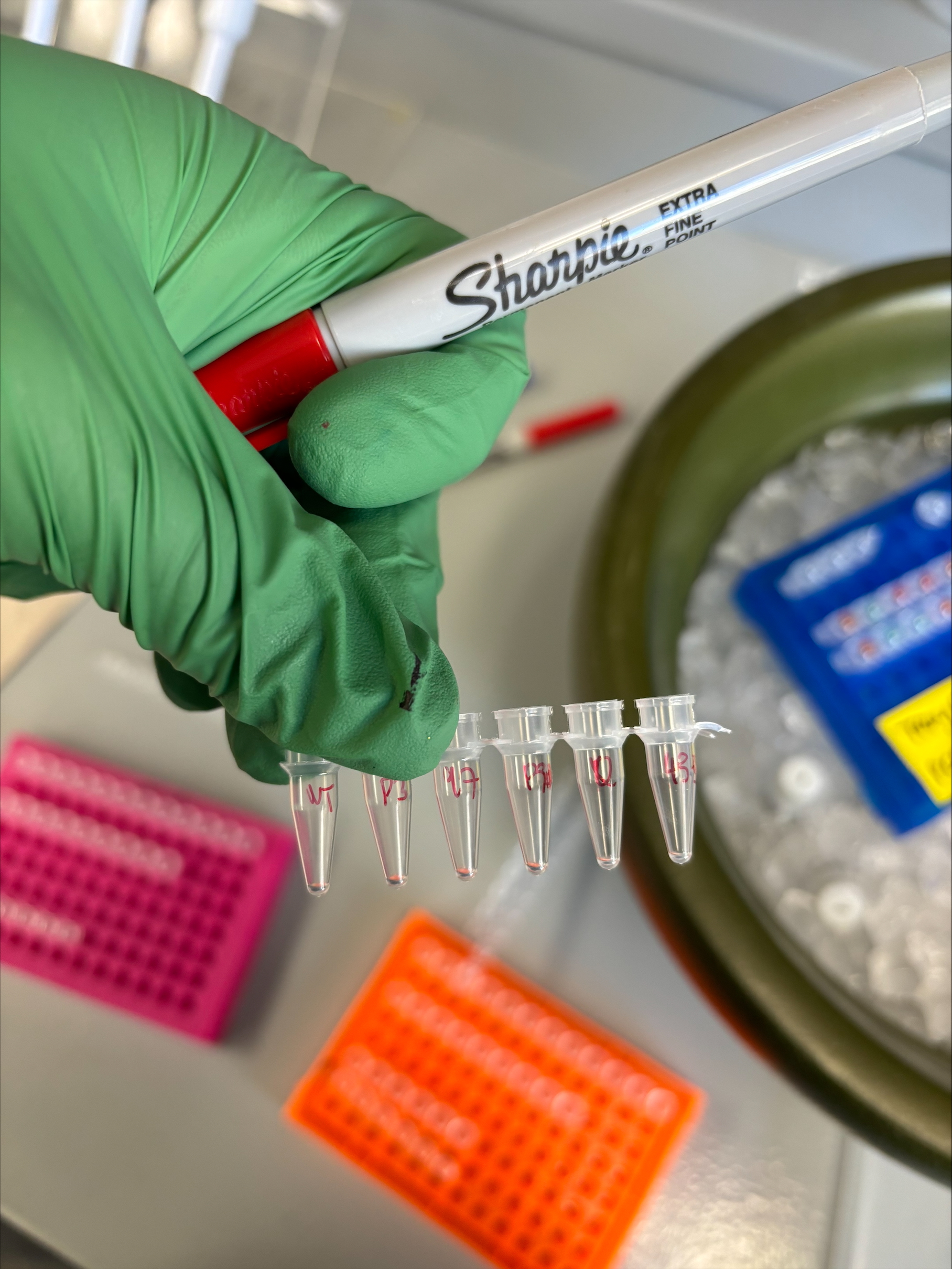
Sam conducted work in the Benning lab, where work focuses on the lipid metabolism in photosynthetic organisms. Credit: Sam Hu.
Sam Hu, an undergraduate student in Plant Biology, is wrapping up a research project in the lab of MSU-DOE Plant Research Laboratory director Christoph Benning.
“In many ways, this has been a life-changing experience,” Hu said. “In my day-to-day work, at first, I mostly took care of plant care genotyping and data collection.”
As time went on, he began to gain perspective on the work and understand the deeper biological processes at the heart of the research — eventually taking on a larger role in projects, building skills in data analytics and experimental design.
Hu said the ability to consult with a mentor — in this case, Dr. Jinjie Liu, a fixed-term professor in the PRL and a research associate in the Benning Lab — was a valuable experience, presenting the opportunity to talk through hurdles and brainstorm solutions.
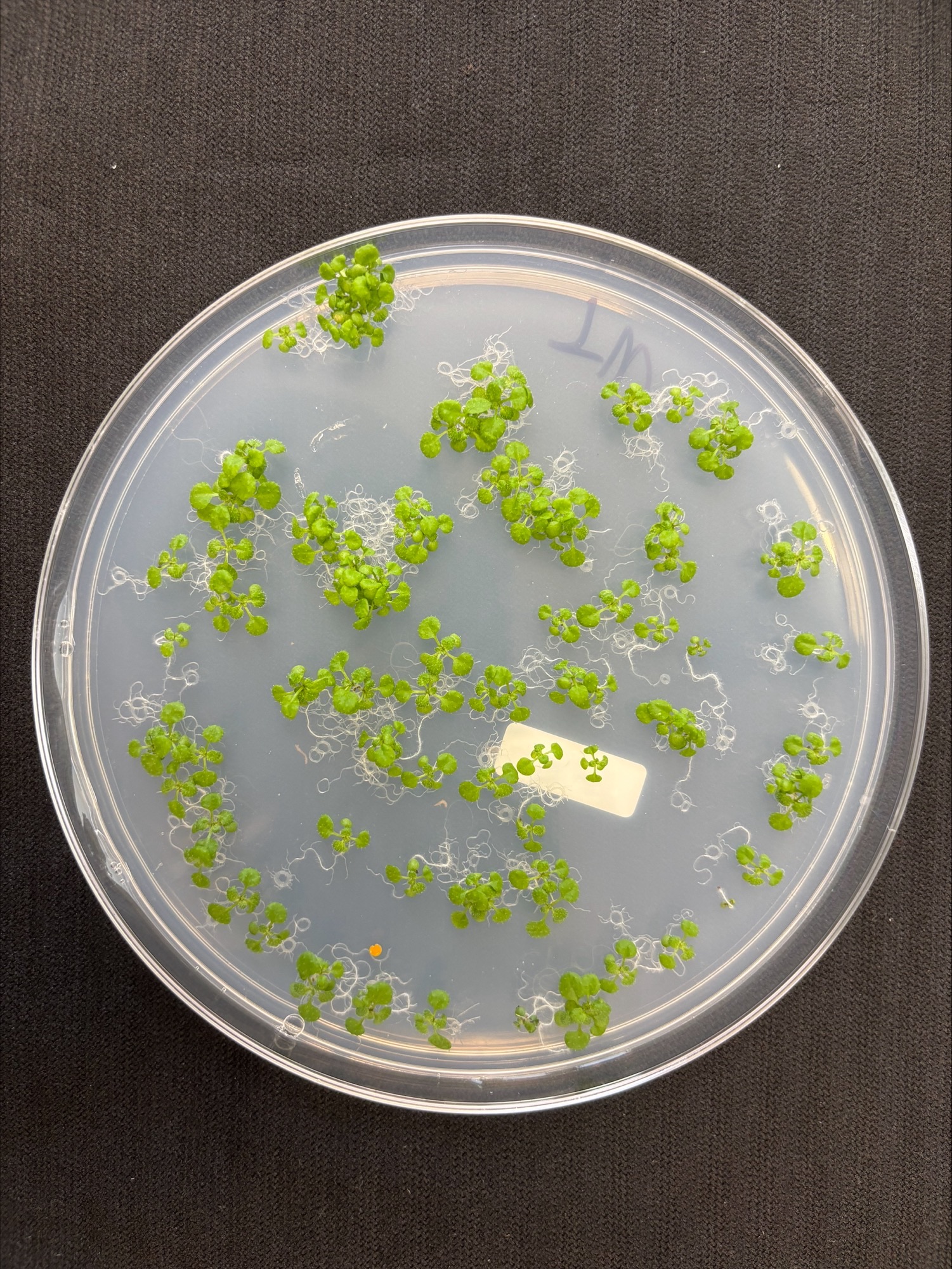
Sam Hu helped conduct research in the Benning lab. Credit: Sam Hu.
“I would come into the lab on a regular basis and discuss with Dr. Liu about the results of the experiment and what to do next, and I would do much of the bench work; but Dr. Liu would give me advice on how things should be done.”
Claire Henley, now a research technician in the Josephs Lab at MSU, took on multiple undergraduate research projects as an undergrad.
“I did my first undergrad research at the Morton Arboretum in Lisle, Il, and later studied the variation of leaf shape in an endangered desert oak species (Quercus havardii) on a cattle ranch in Western Texas,” Henley said.
Henley credits the skills she developed during her research experience as instrumental in securing her current position with the Josephs lab. “This project made a huge impact on my life; I went back to Texas the following summer to help the new REU student with his project. Together, along with our mentors, we are submitting a paper on our findings.”

Claire Henley (right) traveled across research sites in Texas with collaborators during a research project in 2022. Credit: Claire Henley.
“The senior capstone was helpful in teaching me that even a "final" product can always be edited and improved. By the end of this class, my poster was significantly improved,” she said, explaining that peers' feedback helped refine and clarify the research she’d go on to present at UURAF.
High-impact, high-caliber
Brian Keas, Director for Undergraduate Research in the Provost’s Office and an MSU alum, emphasizes the value of equipping undergraduates with these skills. Keas’ office organizes UURAF each year, bringing undergraduate research to the forefront of the campus community.
“UURAF provides a focal point, an end goal, for students to aim for – it gets them to practice and to prepare. It also provides a university-wide celebration of undergraduate research – to show students, faculty and campus leaders the amazing work that’s going on across campus,” said Keas, adding that “I'm involved with supporting undergraduate research now, because I got involved when I was an undergraduate student.”
“I was able to apply classroom concepts to projects, and that motivated me — eventually to move through graduate school and faculty positions.”
What Plant Biology is doing, Keas affirmed, is implementing high-impact practices — strategies which help increase student engagement and success.
Keas says that for Plant Biology students aspiring to be plant biologists, “if you’re going to a conference, you have to learn how to communicate effectively – get your message across, whether you’re talking to a scientist, or someone who just enjoys gardening.”
UURAF offers a chance to get people out of their silos and to showcase intellectual diversity, Keas noted. “We expect to host over a thousand undergraduate students and likely over five-hundred mentors across grad students, postdocs and faculty.”
Among the hundreds of students presenting at UURAF this year will be nearly two-dozen Plant Biology students.
The next grand prize winner could very well be amongst them.
